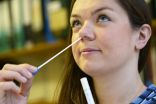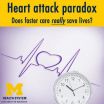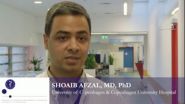Flusurvey scientists at the London School of Hygiene & Tropical Medicine will analyse weekly information relating to symptoms, provided in an online questionnaire by participants, to monitor if flu is taking hold over the winter months.
They will team up with Public Health England (PHE) and i-sense, an £11M EPSRC funded interdisciplinary research collaboration led by UCL to develop early warning sensing systems for infectious disease, to compare this information with the results of swab samples and with 'big data' on millions of symptoms reported every day via sources such as Twitter.
Complaints of coughs, colds and flu-like symptoms are a common feature of life at this time of year but not all sniffles are a sign of flu. Verifying cases of a virus through testing is a crucial part of efforts to spot a pandemic flu outbreak with the potential to cause serious illness and death, and Flusurvey data feeds into national surveillance programmes.
This year, some participants who sign up at http://www.flusurvey.org.uk will provide a self-administered nasal swab, enabling official confirmation and a more accurate picture of flu trends in the UK.
Swabs will be sent to 700 participants of different ages and in different locations, selected to represent the population as a whole. If they report an influenza-like illness in their weekly Flusurvey update, they will use the swab themselves at home and see the results in a matter of minutes - much like a home pregnancy test. They will submit their results via email as well as posting the test to a PHE laboratory for verification.
The number of positive tests received each week will be compared to figures obtained by GP-based virological sampling run by PHE for the same week.
UK Flusurvey's coordinator, Clare Wenham, Research Fellow in Public Health Engagement at the London School of Hygiene & Tropical Medicine, said: "Virological swabbing is an exciting development of the Flusurvey project as it is going to allow us to see whether those who report symptoms online actually are suffering from a flu virus or something else entirely. This way we can get a much better understanding of the burden of flu at any one time in the UK.
"The ability to rapidly detect a novel strain of influenza is often hampered as most cases do not present at primary care, and the symptoms associated with flu are shared by many diseases. Piloting a system of detecting influenza in the community by self-administered swabbing, linked to an existing internet-based cohort, should enable rapid detection of influenza in the future."
Professor Rachel McKendry, Director of i-sense at UCL, added: "This exciting project will identify flu outbreaks much earlier than ever before and help us to develop a new generation of mobile phone-connected tests allowing people to report their symptoms and self-test in their own homes. Throughout this flu season, i-sense researchers at UCL will be using this data to develop a mobile app which will provide up to the minute information about flu hotspots. In future, mobile phone connected tests could also help patients gain more rapid access to follow up care."
The annual UK Flusurvey, now in its sixth year, collects data from men, women and children of all ages around the country. This is used to map trends as seasonal flu takes hold, enabling researchers to analyse how a virus spreads and who it may affect. The data is supplied weekly to PHE's national flu surveillance programmes. Anyone can take part in Flusurvey at http://www.flusurvey.org.uk and it only takes a couple of minutes each week.
New findings released today from last year's survey reveal that every person suffering from a flu-like illness loses the equivalent of two days of healthy life.1 More than 5,000 people took part in the UK Flusurvey last year.
In previous years, Flusurvey data has revealed that doing vigorous exercise for at least 2.5 hours a week reduces your chances of experiencing a flu-like illness by around 10%, dispelled the myth that taking public transport makes you more likely to get flu, and shown that "man flu" does not really exist.
Researchers are calling for members of the public across the UK to sign up to participate in order to collect as much data as possible to map this year's flu trends and to help medics and health services prepare. Traditional monitoring methods rely on data from GPs or hospitals, but Flusurvey provides a unique insight because many people with flu-like illness do not visit a doctor.
Flusurvey is linked with comparable surveys in 10 European countries: France, Italy, Spain, Portugal, Ireland, Sweden, Denmark, Belgium, the Netherlands and the United Kingdom. Online maps make it possible to track the spread of seasonal flu across the continent.
INFORMATION:
The research is funded by an EPSRC i-sense Exploratory Project grant.
For more information or to request interviews, please contact the London School of Hygiene & Tropical Medicine press office: 020 7927 2802 or press@lshtm.ac.uk.
Notes to Editors:
1 Although most people recover from flu, it can make people feel very unwell and reduce their quality of life while they are ill. By combining this information with the length of illness reported, the Flusurvey researchers say that having flu is equivalent to losing 2 days of healthy life. Full data available at http://www.flusurvey.org.uk/en/results
Photos available for download of Clare Wenham using the swab kit and swab kit close-up. Please credit London School of Hygiene & Tropical Medicine: http://track.vuelio.uk.com/z.z?l=aHR0cDovL2xzaHRtYWMuaW1hZ2VzLnZ1ZWxpby51ay5jb20vcGlja3VwcGljdHVyZXMudGx4P3BrcHBpZD02NzY0OTI%3d&r=4502315916&d=1024613&p=1&t=h&h=f232473e9eeeda3be1111deec36161f0
Get in touch with Flusurvey on Twitter @flusurvey and Facebook.
About the London School of Hygiene & Tropical Medicine
The London School of Hygiene & Tropical Medicine is a world-leading centre for research and postgraduate education in public and global health, with 3,900 students and more than 1,000 staff working in over 100 countries. The School is one of the highest-rated research institutions in the UK, and was recently cited as the world's leading research-focused graduate school. Our mission is to improve health and health equity in the UK and worldwide; working in partnership to achieve excellence in public and global health research, education and translation of knowledge into policy and practice. http://www.lshtm.ac.uk Get in touch on Twitter @lshtmpress
About i-sense
i-sense is a 5 year Interdisciplinary Research Collaboration in Early Warning Sensing Systems for Infectious Diseases, funded by the Engineering and Physical Sciences Research Council (EPSRC). We aim to detect outbreaks of serious infections - including new strains of influenza, MRSA and HIV - much earlier than ever before by linking self-reported symptoms on social media and search engines with a new generation of mobile phone-connected diagnostic tests. The programme brings together an interdisciplinary team of researchers from UCL, Imperial College, London School for Hygiene and Tropical Medicine, Newcastle and Surrey universities, clinicians at UCL Partners, UCLH BRC, Newcastle BRC, Public Health England and industry. For more information about our research and funding opportunities, please visit http://www.i-sense.org.uk or contact i-sense Administration and Communications Manager, Kailey Nolan at k.nolan@ucl.ac.uk. Follow us on Twitter @isenseIRC
About UCL (University College London)
Founded in 1826, UCL was the first English university established after Oxford and Cambridge, the first to admit students regardless of race, class, religion or gender, and the first to provide systematic teaching of law, architecture and medicine. We are among the world's top universities, as reflected by performance in a range of international rankings and tables. UCL currently has almost 29,000 students from 150 countries and in the region of 10,000 employees. Our annual income is more than £900 million. http://www.ucl.ac.uk | Follow us on Twitter @uclnews | Watch our YouTube channel YouTube.com/UCLTV



